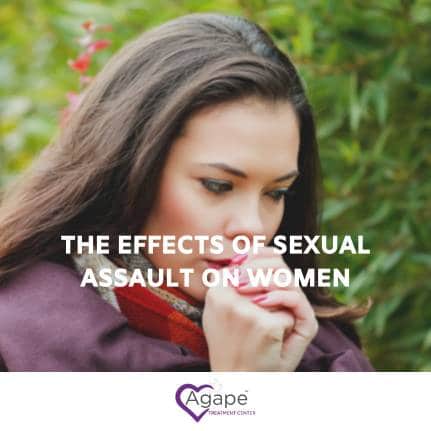
Survivors of sexual assault may feel as if they are unable to open up about their assault. When this happens, women who have been sexually assaulted may begin developing unhealthy coping mechanisms, mental health conditions, and an array of additional issues. If you or a loved one has been sexually assaulted and is afraid to talk about their attack, consider calling the National Sexual Assault Hotline. Oftentimes, residential mental health treatment is necessary for survivors of sexual assault in order to overcome trauma and symptoms of PTSD.
Table of Contents
ToggleWhat is Sexual Assault?
Sexual assault is defined as illegal sexual contact, usually involving force upon a person who did not give consent or is unable to consent due to age or physical and mental incapacity. Sexual assault is extremely traumatizing for victims, whether or not physical force was used.
Many people respond to an assault by displaying symptoms of shock. For example, a victim may appear calm, composed, or subdued. This is the mind’s defense mechanism in order to protect the victim from realizing the true extent of the traumatic experience they have endured. However, this period of shock will eventually turn into symptoms of PTSD without proper therapy and treatment.
Common examples of sexual assault:
- Being taken advantage of by someone who has authority over you (boss, parent, teacher, doctor)
- Bribed or manipulated into performing unwanted sexual acts against her will
- Being forced into sexual activity because a woman is unable to consent due to intoxication or being mentally/physically incapacitated
- Being physically forced or violently sexually assaulted
While there are many different forms of sexual assault, each one is a violation of another person’s bodily rights. Sexual assault ranges from sexual groping, assault/battery, to rape. Unfortunately, many cases of sexual assault go unreported due to the stigma placed upon women who have been assaulted. In order to prevent women from suffering in silence, this stigma must be broken. Rather than accusing women of lying about their assault, we need to support and guide them towards the proper resources.
Effects of Sexual Assault on Women
Unfortunately, women who have endured sexual assault may experience PTSD, mental health conditions, and a wide variety of other challenges. Some are short-term hurdles while others seem chronic.
Short-Term Effects
After being sexually assaulted, there are many different ways women may react. Since sexual assault is severe trauma, emotions can range from denial to severe anger and thoughts of revenge. Survivors of sexual assault are often unable to process their emotions without professional help. As a result, many survivors attend residential treatment.
If you or a loved one has been sexually assaulted, you may be displaying one or many of these symptoms:
- Shock and disbelief
- Mistrust, sense of betrayal
- Memory loss
- Irritability, edginess
- Heightened sensitivity to touch
- Repulsion to sexual contact, or hypersexuality
- Change in eating or sleeping habits
- Shame, humiliation, embarrassment
- Guilt
- Anger, thoughts of revenge
- Disorientation, confusion
- Overwhelmed, fear of “going crazy”
- Intense fear of injury or death
These symptoms only cover the most common reactions to sexual assault. Every woman is different, so each individual will display varying symptoms and emotions after experiencing sexual trauma. If you or a loved one has been sexually assaulted, contact a licensed professional who can help you to begin your journey of recovery.
Long-Term Effects
Like any form of trauma, sexual assault produces negative, long-term side-effects when left untreated. If a woman has experienced sexual violence, rape, or any other form of sexual assault, they may experience some of the following symptoms:
- Headaches
- Chronic and long-term pain
- Insomnia
- Poor physical and mental health
- Asthma
- Irritable bowel syndrome
- Severe anxiety, stress, or fear
- Flashbacks and panic attacks
- Post-traumatic stress disorder
- Substance use disorder
- Depression
- Eating disorders
- Sexually transmitted infections
- Pregnancy
- Self-injury or suicide
Sexual assault can produce long-term side effects when left untreated. One of the most common symptoms of untreated trauma due to sexual assault is the development of post-traumatic stress disorder.
Post-Traumatic Stress Disorder Caused by Sexual Assault
Sexual assault is one of the leading causes of PTSD in women. Unfortunately, large survey studies have found that 1 out of 3 women will be sexually assaulted in their lifetime. Even more concerning, many of those women never seek help due to the way society treats victims of sexual assault. For example, women are often told that they should have dressed more conservatively, drank less alcohol, or are accused of lying. Consequently, many women are afraid to speak up and receive treatment for their trauma, causing the development of PTSD.
Symptoms of PTSD caused by sexual assault:
- Depression
- Anxiety
- Flashbacks or hyper-reactivity to a stimulus that reminds them of the trauma
- Intrusive symptoms like random thoughts which will drastically change their demeanor
- Avoiding people, places, or things that remind them of the trauma
- Hyper-sensitivity and easily triggered feelings
- Detrimental on their ability to function day-to-day
Friends or loved ones may notice increased irritability, outbursts of anger, feelings of numbness, or substance abuse. Additionally, their loved one might become less social or afraid to leave their house after experiencing sexual trauma. If your loved one is displaying any of these symptoms, it is important to support them and steer them towards residential treatment or therapy.
Treatment for Women With PTSD Stemming from Sexual Assault
If your loved one is displaying signs of post-traumatic stress disorder or signs of experiencing sexual assault, they may need to attend trauma-informed mental health treatment. At Agape Treatment Center, we provide our patients with unconditional support, evidence-based therapies, and individualized treatment plans in order to ensure they receive the best treatment possible. If you would like to begin a new way of life and let go of your trauma, call Agape Treatment Center today!






